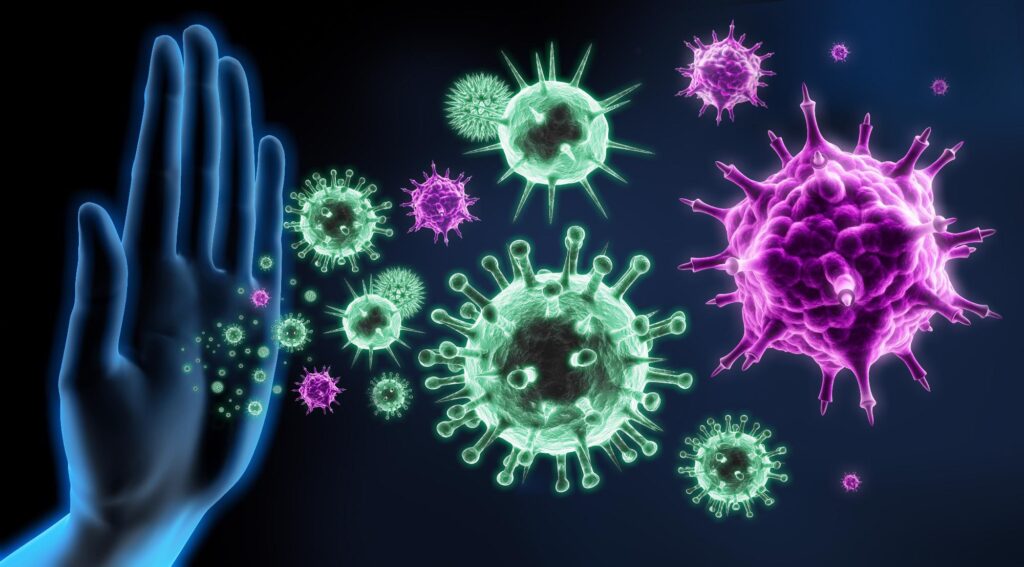How to improve your immune system

The immune system is a network of biological processes that protects an organism from diseases. It detects and responds to a wide variety of pathogens, from viruses to parasitic worms, as well as cancer cells and objects such as wood splinters, distinguishing them from the organism’s own healthy tissue. Many species have two major subsystems of the immune system. The innate immune system provides a preconfigured response to broad groups of situations and stimuli. The adaptive immune system provides a tailored response to each stimulus by learning to recognize molecules it has previously encountered. Both use molecules and cells to perform their functions.
Function of the Immune System
When the immune system first recognizes these signals, it responds to address the problem. If an immune response cannot be activated when there is sufficient need, problems arise, like infection. On the other hand, when an immune response is activated without a real threat or is not turned off once the danger passes, different problems arise, such as allergic reactions and autoimmune diseases.
The overall function of the immune system is to prevent or limit infection. An example of this principle is found in immune-compromised people, including those with genetic immune disorders, immune-debilitating infections like HIV, and even pregnant women, who are susceptible to a range of microbes that typically do not cause infection in healthy individuals.
The immune system can distinguish between normal, healthy cells and unhealthy cells by recognizing a variety of “danger” cues called danger-associated molecular patterns (DAMPs). Cells may be unhealthy because of infection or because of cellular damage caused by non-infectious agents like sunburn or cancer. Infectious microbes such as viruses and bacteria release another set of signals recognized by the immune system called pathogen-associated molecular patterns (PAMPs).
The immune system is complex and pervasive. There are numerous cell types that either circulate throughout the body or reside in a particular tissue. Each cell type plays a unique role, with different ways of recognizing problems, communicating with other cells, and performing their functions. By understanding all the details behind this network, researchers may optimize immune responses to confront specific issues, ranging from infections to cancer.
How to improve your immune system:
-
- Eat a healthy, balanced diet: Healthy foods provide nutrients, vitamins and minerals to keep us strong and well. Eat a varied diet that focuses on high-quality foods such as whole grains, nuts and fresh fruits and vegetables. The more colorful your plate is, the better.
- Drink clean water: Water is still the best thing you can drink. Each person varies, but aim to drink eight, 8-ounce glasses of water a day. That can be hard to do. Your body get dehydrated after hours of sleep, so drink a glass of water right away when you wake up. If you struggle with drinking enough water, set reminders throughout the day or drink a glass of water before each meal. Caffeine-free hot tea can count as part of your daily water tally.
- Exercise regularly: Aim to do moderate exercise 150 minutes a week, which is about 30 minutes a day for five days a week. Examples of moderate exercise include jogging, swimming and walking at a brisk pace.
- Reduce stress levels: Daily stress can overwork your immune system and drain your ability to stay healthy. Big and little daily stressors can constantly push your immune system. That’s why it’s important to take time for self-care. Make time each day to do things to “refill your tank.” Self-care varies from person to person. It can include setting aside time to read, meditate, talk a walk, do a hobby or get a massage.
- Get plenty of sleep: Not getting enough sleep can make you more susceptible to illness, and getting adequate sleep has been shown to be beneficial for immune function. That’s why you’re more likely to get sick when you’re exhausted. Adults need seven to eight hours of sleep every night, teenagers need nine to 10 hours of sleep, and younger children usually need 10 or more hours of sleep.
- Get vaccinated
References
Overview of the Immune System | NIH: National Institute of Allergy and Infectious Diseases
Six Ways to Boost Your Immune System Naturally Before You Get Sick (allinahealth.org)
8 ways to strengthen your immune system – The Well : The Well (unc.edu)
